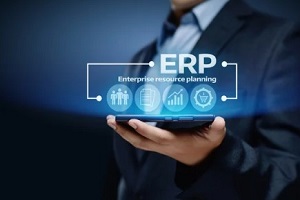Enterprise Resource Planning (ERP) systems have become important tools in modern business. They offer a unified and centralized approach to managing core business processes, ranging from procurement and supply chain operations to accounting, customer relationship management, and human resources. ERP systems combine disparate business functions into one complete system, streamlining workflows and improving efficiency and productivity.
There are two types of ERP systems available: on-premise and cloud-based solutions. On-premise ERP systems are installed locally on a company’s hardware and servers and are managed by its IT staff. In contrast, cloud-based ERP systems are hosted on the vendor’s servers and accessed via the Internet.
Selecting an ERP system involves carefully considering several factors, including the size and type of business, specific needs and goals, budgetary constraints, and IT resources. Before deciding, evaluate each ERP system’s unique features, benefits, and drawbacks.
This article comprehensively compares on-premise and cloud-based ERP systems, highlighting their differences and similarities, and their respective advantages and disadvantages. The goal is to assist businesses in determining the most appropriate ERP system to support their operations and strategic objectives.
Understanding On-Premise ERP Systems
 On-Premise ERP systems are installed and operated from a client’s in-house server and computing infrastructure. As the name suggests, these systems require a significant investment in hardware, software and related resources. However, they offer a high level of control and customization that can benefit certain businesses.
On-Premise ERP systems are installed and operated from a client’s in-house server and computing infrastructure. As the name suggests, these systems require a significant investment in hardware, software and related resources. However, they offer a high level of control and customization that can benefit certain businesses.
The operation of on-premise ERP systems is based on a central database that integrates various business functions into a single system. The integrated functions include financial management, supply chain monitoring, customer relationship management, human resources, etc. Each function shares data with the others, allowing for real-time updates and improved communication across the organization.
On-premise ERP systems offer the notable advantage of being customizable to fit the unique needs of a business. This solution is particularly beneficial for those with intricate operations or unconventional procedures that standard systems cannot easily accommodate. Additionally, businesses are free to establish their security protocols and measures for data protection.
Large enterprises with abundant resources have traditionally been the main users of on-premise ERP systems. They possess the necessary capital for the high initial investment and have specialized IT teams to maintain and manage the system. However, some small to medium-sized businesses with specific requirements also opt for on-premise systems, provided they can justify the initial investment and ongoing maintenance costs.
Understanding Cloud-Based ERP Systems
Cloud-based ERP systems, often called Software as a Service (SaaS), represent a modern approach to enterprise resource planning. Unlike their on-premise counterparts, these systems are hosted on the vendor’s servers and accessed via the Internet. This model shifts the technical responsibilities from the user to the provider, creating an entirely different set of advantages and considerations.
Operationally, cloud-based ERP systems are similar to on-premise ones; they aim to integrate different business functions into a unified system. The key difference lies in the deployment model, where local servers and maintenance are accessed through a web browser. This solution makes businesses less concerned with technical upkeep and more focused on using the functionalities.
 A principal feature of cloud-based ERP systems is their scalability. As businesses grow, their ERP system can scale up to match their increasing needs.
A principal feature of cloud-based ERP systems is their scalability. As businesses grow, their ERP system can scale up to match their increasing needs.
This scalability also extends to cost; businesses typically pay a subscription fee based on usage, meaning costs can be managed and predicted more effectively than with the significant upfront expenses associated with on-premise systems.
Another important feature is accessibility. As these systems are web-based, users can access the ERP system from anywhere with an internet connection, providing increased flexibility and remote working capabilities.
Cloud-based ERP systems are particularly suited to small and medium-sized businesses due to their cost-effectiveness and ease of implementation. However, larger businesses also utilize cloud-based ERP systems, especially when they have multiple locations or require a high degree of remote access.
Comparing On-Premise ERP & Cloud-Based ERP Systems
When comparing on-premise and cloud-based ERP systems, it is essential to consider the distinct features, costs, scalability, security, customization capabilities, and deployment time of both.
- Features: Both systems offer similar basic functionalities, providing integrated management of core business processes. However, on-premise ERP systems often have more advanced features and extensive customization options. In contrast, cloud-based ERP systems offer greater accessibility and are typically easier to use, with intuitive interfaces and user-friendly design.
- Costs: On-premise ERP systems require a large upfront investment in hardware and software and ongoing system maintenance and upgrade costs. Conversely, cloud-based ERP systems operate on a subscription model, generally making them more cost-effective, especially for small and medium-sized businesses.
- Scalability: Cloud-based ERP systems are highly scalable, able to adjust resources per business needs. This flexibility is particularly advantageous for growing businesses. On-premise ERP systems, while scalable, often require additional hardware and software purchases, increasing costs.
- Security: On-premise ERP systems offer businesses greater control over their data security as they manage their security protocols. However, reputable cloud-based ERP providers typically have robust security measures in place. They often provide security beyond what a small or medium-sized business could achieve.
- Customization: On-premise ERP systems allow extensive customization to accommodate unique business needs. In contrast, cloud-based ERP systems offer some customization but are generally less flexible than their on-premise counterparts.
- Deployment Time: On-premise ERP systems can be time-consuming due to their complexity and the need for on-site installation. Cloud-based ERP systems, in contrast, can be deployed more quickly as they are web-based and do not require a physical setup.
These key differences between on-premise and cloud-based ERP systems demonstrate that the choice depends on a business’s needs, resources and objectives.
Advantages & Disadvantages Of On-Premise ERP Systems
On-premise ERP systems bring a set of distinct advantages, as well as certain disadvantages, that businesses need to consider.
Advantages
- Control: One of the biggest advantages of on-premise ERP systems is their level of control. Companies can manage and control their data, security, and system upgrades. They can also customize the system to fit their needs, which is especially beneficial for businesses with non-standard processes or unique industry requirements.
- Integration: On-premise ERP systems often integrate more smoothly with other business software, especially if these are also housed on-premise. This can help ensure streamlined workflows and data consistency across the organization.
- Security: Businesses manage their security measures with on-premise ERP, enabling them to implement protocols that meet their needs and standards.
Disadvantages
- Cost: The significant initial investment required for hardware and software can be prohibitive for small and medium-sized businesses. Additionally, ongoing maintenance and upgrade costs can add up over time.
- Maintenance: On-premise ERP systems require a dedicated IT team to handle system maintenance, updates, and troubleshooting. This can divert resources from other strategic areas.
- Scalability: While on-premise ERP systems can be scalable, any increase in scale usually comes with additional costs for hardware and software upgrades.
- Upgrades: Upgrades can be time-consuming and disruptive, requiring system downtime. This can interrupt business operations and productivity.
Advantages & Disadvantages Of Cloud-Based ERP Systems
As with on-premise ERP systems, cloud-based ERP systems have advantages and disadvantages that should be carefully weighed.
Advantages
- Scalability: One of the most compelling advantages of cloud-based ERP systems is their scalability. As businesses grow and their needs evolve, the ERP system can be scaled up accordingly. This is done without the need for substantial hardware or software investments.
- Cost-effectiveness: Cloud-based ERP systems typically operate on a subscription basis, eliminating the need for substantial upfront investments. Furthermore, the vendor typically shoulders the responsibility for system maintenance and upgrades, reducing ongoing costs for the user.
- Accessibility: Since these systems are hosted on the Internet, they are accessible from anywhere with a web connection. This is a significant advantage for businesses with remote teams or multiple locations.
- Quick deployment: Cloud-based ERP systems can be implemented quickly, reducing the time between decision-making and operation. This can be a critical factor for businesses requiring a quick turnaround.
Disadvantages
- Data Control: In a cloud-based ERP system, data is stored on the vendor’s servers, which means businesses have less direct control over their data.
- Internet Dependency: Since these systems are internet-based, they require a reliable, high-speed internet connection. In areas with connectivity issues, this could pose a significant challenge.
- Customization: While cloud-based ERP systems offer some degree of customization, they often don’t provide the same flexibility as on-premise systems.
- Ongoing Costs: While the upfront cost is usually lower, the ongoing subscription fees can accumulate over time and become substantial, particularly for larger businesses.
Choosing The Right ERP System For Your Business
Choosing between on-premise and cloud-based ERP systems depends largely on the needs, resources, and strategic objectives of your business. Both systems have unique strengths and potential challenges; understanding these is necessary to make the most appropriate choice.
In either case, custom software solutions can greatly enhance the effectiveness of your ERP system. Orases can tailor your ERP system, whether on-premise or cloud-based, to meet your unique business requirements and objectives. Our team of skilled developers can provide customized features and interfaces that enhance usability, functionality, and overall efficiency.
With Orases, we don’t just create robust software solutions: we create partnerships. We work closely with our clients to understand their business needs and provide solutions that drive productivity, efficiency, and growth. If you’re looking for a comprehensive ERP solution for your business, contact Orases today.
We are recognized as a top software development company by TopDevelopers.co






